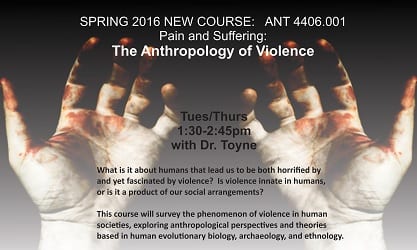Six New Anthropology Courses for Spring 2016
The Department of Anthropology is excited to announce several new classes for Spring 2016.
ANT 3275.0001 Anthropological Perspectives on Refugees
Tuesday/Thursday 1:30pm – 2:45pm
Dr. Vance Geiger
Since the United Nations Convention on Refugees to respond to post World War II refugees, people have continued to flee and claim refugee status. There have been a wide range of responses to these refugee flows. This course approaches the study of refugees from an anthropological and cross-cultural perspective. As such the course will explore both the culturally specific causes of refugee flows and responses to refugees. Topics will include the international definition of a refugee, refugee law, causes of refugee flows, the variety of responses to refugees, refugee asylum, repatriation, and resettlement. In addition, the course will explore the anthropological cross cultural issues refugees experience when they seek asylum and the experiences of resettlement in third countries.
ANT 3930.0001 ST: Anthropology of Plants and People
Tuesday/Thursday 9:00am – 10:15am
Dr. Neil Duncan
In this course, we will utilize an anthropological perspective to explore the interactions between people and plants. People impact plants and landscapes they use, and the plants and resources they utilize in turn influence people. To examine the myriad human-plant relationships that have profoundly shaped, transformed, and influenced human culture and society and the landscapes in which plants and humans interact, we will explore anthropological approaches toward diverse
human-plant topics including diet and cuisine, medicine, ritual and religion, subsistence, the origins of agriculture, plants in archaeology, resource management, and intellectual property rights. The geographic focus of the course will be the Americas.
ANT 4406.0001 Pain and Suffering: The Anthropology of Violence
ANT 4932.0001 ST: Anthropology of Cities
Thursday 3:00pm – 5:50pm
Dr. Scott Branting
Over half of the world’s population and eighty percent of the United States’ population now live in cities, a percentage that continues to increase each year. Understanding cities and their inhabitants is, therefore, critically important to both the present and future of our world. This course will explore cities, along with the activities and social systems that create them and that are enabled by them, in the past and in the present from anthropological, geographical, and archaeological perspectives. Students will be expected to demonstrate familiarity with key concepts and methods as well as apply them through their own engagement with a city of their choice from the past, present, or future.
ANT 4932.0M02 ST: Battles of the Sexes?: The Archaeology of Gender
Tuesday 3:00pm – 4:20pm
Dr. Brigitte Kovacevich
This is a seminar-style course designed to introduce students to the advances in archaeological research on gender and other social identities in the last 25 years. Anthropologists have found that there is great diversity in gender roles and identities through time and across cultures. Gender differences can be related to age and biological sex, but there is significant variation in the kinds of tasks, leadership roles, and ritual practices that different genders perform. This course will explore the socially constructed ideologies that underlie these identities.
We will read and discuss case studies from around the world, as well as topics such as biological sex vs. gender vs. sexuality, masculinity, motherhood, the sexual division of labor, and the limitations of a two sex/two gender approach (among others). We will use ethnographic and textual evidence as interpretive guides in exploring these topics, but will focus on the use of material culture to elucidate gender roles. Central questions of the course will include, how do we find these behaviors in the archaeological record, which are often only considered to be accessible through texts or direct observation of behavior? And, how can we use material culture, such as pottery, stone tools, figurines, bones, graves, and architecture to engender archaeology? This course is appropriate for any student interested in ancient cultures and/or the social construction of identity.
ANT 4932.0M03 ST: Saving the Plundered Past: Ethics and Controversy in Contemporary Archaeology
Thursday 3:00pm – 4:20pm
Dr. Michael Callaghan
Archaeology is generally associated with the study of the past, but more and more, it serves a modern world. Archaeologists are frequently involved in genocide and natural disaster recovery efforts, and they work with law enforcement in high-profile trafficking crimes. They assist local communities in sustainable living projects, and they advise governments and stakeholders on a wide variety of environmental concerns. They are occasionally called upon to assist in the planning of wars, and are essential to the development of national narratives under dictatorial and democratic regimes. In the context of a world recession, archaeology generates millions of tourism dollars each year even as priceless heritage sites crumble under the lack of government funds.
This course considers the sometimes-controversial nature of archaeological research in contemporary society. Through lectures, seminar discussion, and independent research, students analyze the role of scientific archaeology in human rights and legal cases, heritage management policy, disasters, war, tourism, and illegal artifact trafficking.
We hope you find the classes interesting and we look forward to your feedback on the new subject matters.

